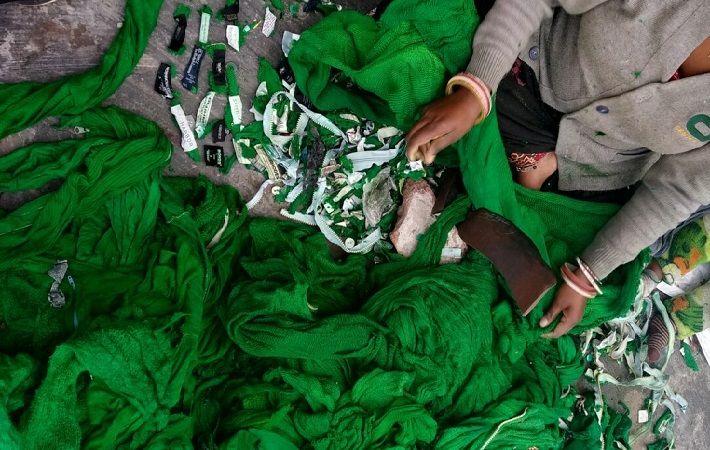
The project brings together industry players including Fashion for Good partners: Adidas, Levi Strauss & Co., PVH Corp., Arvind Limited, Birla Cellulose and Welspun India. A key technology partner for the project is Fashion for Good innovator Reverse Resources who provides the analysis of the pre-consumer textile waste streams in addition to designing and running the pre-consumer pilot. The project is supported through catalytic funding provided by Laudes Foundation, Fashion for Good said in its press release.
“India is a critical hub, not only for textile production and consumption, but also as a global post-consumer textile waste destination. This project is pivotal to understanding the size of this considerable market and providing the incentive, tools and means for the industry to benefit from the wealth of this untapped resource,” said Katrin Ley, managing director at Fashion for Good.
With the launch of the Sorting for Circularity India Project, Fashion for Good calls on industry stakeholders within the textile waste sector in India to collaborate in this ambitious project to map the Indian textile waste landscape. Data and resources volunteered are crucial to obtaining real world estimates beneficial to mapping the landscape and successfully testing technologies that are best placed to address the challenges.
“Fossil-fuel based synthetic materials will continue to dominate fashion unless innovations are scaled up, there’s buy-in from the market, and the supply chain infrastructure is developed. We’re pleased to see Fashion for Good and Reverse Resources collaborate to drive forward the creativity and ingenuity needed to unlock the potential of circular materials within the industry,” said Anita Chester, head of materials at Laudes Foundation.
In addition to the lack of accurate information, no technologies currently exist that organise, categorise and sort materials to ensure quality textile waste is accessible for recyclers, who require sorted feed stocks in large volumes. While these are not the only challenges faced by recyclers, they are significant barriers to the growth of chemical recycling technologies in India.
“Recycling technologies are going to be the future of the industry and to get there we need access to traceable, high-quality textile waste for all waste streams. We will be looking at efficiently recycling traceable textile waste and help along in building a new textile waste value chain in India. This project is a great opportunity to help organise the India textile waste market, making it traceable and accessible to recyclers, manufacturers, and brands,” said Abhishek Bansal, head sustainability at Arvind Limited.
The Sorting for Circularity India project aims to address these challenges and build an accessible infrastructure for manufacturers, sorters, collectors, waste handlers and recyclers in India. Over 15 months, the project will demonstrate a new textile value chain across three phases. Firstly, by obtaining an overall understanding of the textile waste supply chain of pre- and post-consumer textile waste in India. Secondly, by identifying and piloting technologies that enable the traceability of textile waste and its accessibility to existing recyclers. Finally, providing recyclers with access to textile waste feedstocks that meet the quality parameters of advanced recycling technologies, giving these technologies an incentive to scale in India, the press release added.
“Sorting for Circularity is a very relevant project for the entire textile value chain. I see a lot of incremental value that can be captured by properly sorting the various waste streams and bringing them back into circularity. It will require multi stakeholder participation to reach the desired scale. We are happy to be a part of this project and contribute towards this great initiative to preserve the national capital while reducing dependency on fresh resources,” said Umasankar Mahapatra, group head – innovation and sustainability at Welspun India Limited.
Kicking off earlier this month, the first phase to map the current supply chain of textile waste draws on the expertise and technology of Reverse Resources. This phase also ??leverages the knowledge, experience and on-the-ground support of local stakeholders Sattva Consulting, a social development consulting and research firm with experience in undertaking landscape, market and community-based studies, and Saahas Zero Waste, proficient in waste management with a stronghold on the informal sector in India and is supported by suppliers selected by the project industry partners who participate in the study. The results and learnings from this phase will be shared in an open source report available to the public, to be released in mid-2022.
Fibre2Fashion News Desk (RR)